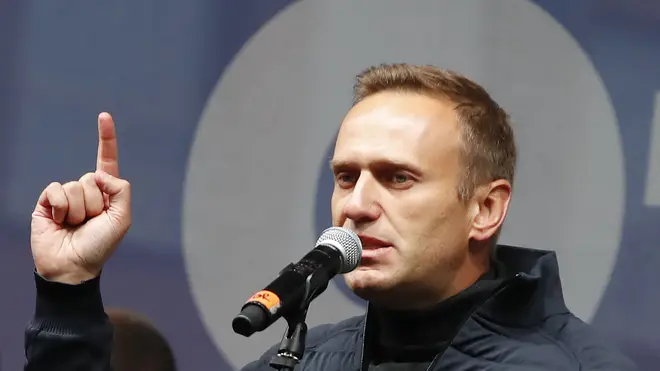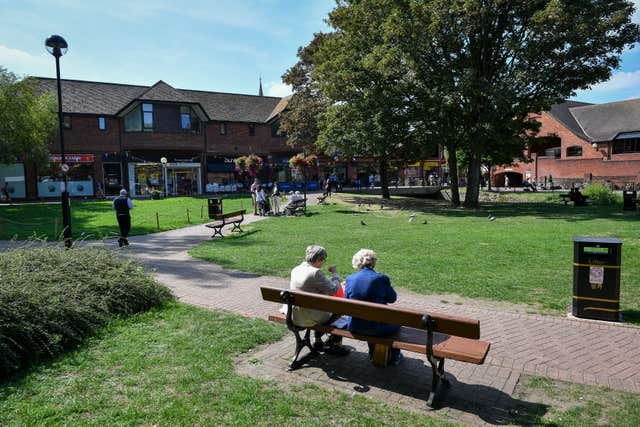
Nick Ferrari 7am - 10am
3 September 2020, 14:04

The politician and corruption investigator is in hospital in Berlin.
Russian opposition leader Alexei Navalny was the victim of an attack and poisoned with the Soviet-era nerve agent Novichok, the German government has said.
Mr Navalny, a politician and corruption investigator who is one of Russian President Vladimir Putin’s fiercest critics, fell ill on a flight back to Moscow from Siberia on August 20 and was taken to hospital in the Siberian city Omsk after the plane made an emergency landing.
He was transferred two days later to Berlin’s Charite hospital, where doctors last week said initial tests indicated Mr Navalny had been poisoned.
Chancellor Angela Merkel’s spokesman Steffen Seibert said in a statement that testing by a special German military laboratory had now shown “proof without doubt of a chemical nerve agent from the Novichok group”.
“It is a dismaying event that Alexei Navalny was the victim of an attack with a chemical nerve agent in Russia,” Mr Seibert said.
“The German government condemns this attack in the strongest terms.”
Mrs Merkel said Mr Navalny was the victim of an “attempted murder by poisoning” and the aim was to silence him.
She said there are “very serious questions that only the Russian government can answer and must answer”.
Germany’s foreign minister Heiko Maas said the Russian ambassador has been summoned and told that Berlin expects a full and transparent investigation.
British authorities identified Novichok as the poison used in 2018 on former Russian spy Sergei Skripal and his daughter in England.
The nerve agent is a cholinesterase inhibitor, part of the class of substances that doctors at the Charite initially identified in Mr Navalny.

Germany demanded a response from the Russian government.
The Kremlin said on Wednesday it had not been informed yet of Mr Navalny being poisoned with a nerve agent.
“Such information hasn’t been relayed to us,” Kremlin spokesman Dmitry Peskov told the state Tass news agency.
Mr Seibert said the German government would inform its partners in the European Union and Nato about the test results.
He said that it will consult with its partners in light of the Russian response “on an appropriate joint response”.
Germany will also contact the Organisation for the Prohibition of Chemical Weapons, he added.
Mr Navalny’s allies in Russia have insisted he was deliberately poisoned by the country’s authorities, accusations that the Kremlin rejected as “empty noise”.
В 2020 году отравить Навального именно «Новичком» — это ровно то же самое, что оставить на месте преступления автограф. Вот такой: pic.twitter.com/qG9HuPwtYX
— Leonid ❌ Volkov (@leonidvolkov) September 2, 2020
“To poison Navalny with Novichok in 2020 would be exactly the same as leaving an autograph at a crime scene, like this one,” Mr Navalny’s longtime ally and strategist Leonid Volkov said in a tweet that featured a photo of Mr Putin’s name and a signature next to it.
The Russian doctors who treated Mr Navalny in Siberia repeatedly contested the German hospital’s poisoning conclusion, saying they had ruled out poisoning as a diagnosis and that their tests for cholinesterase inhibitors came back negative.
In Charite’s latest update, the hospital said Mr Navalny was still in an induced coma but in a stable condition.
Novichok is a class of military-grade nerve agents developed by the Soviet Union at the end of the Cold War.
Western weapons experts say it was only ever manufactured in Russia.
After the Skripals were poisoned, Russia said the US, Britain and other Western countries acquired the expertise to make the nerve agent after the Soviet Union collapsed, and that the Novichok used in the attack could have come from them.

According to the Organisation for the Prohibition of Chemical Weapons, there is no record of Novichok having been declared by any nation that signed the chemical weapons convention.
Britain has charged two Russians – alleged to be agents of the Russian military intelligence service GRU – in absentia with the 2018 attack, which left the Skripals in a critical condition and killed a local woman.
Russia has refused to extradite the men to the UK.
British police believe the nerve agent was smuggled to Britain in a counterfeit Nina Ricci perfume bottle and sprayed on the front door of Sergei Skripal’s house in Salisbury.
More than three months later, the bottle was found by a local man, 48-year-old Charlie Rowley.
He was admitted to hospital and his girlfriend Dawn Sturgess, 44, died after being exposed to the contents.